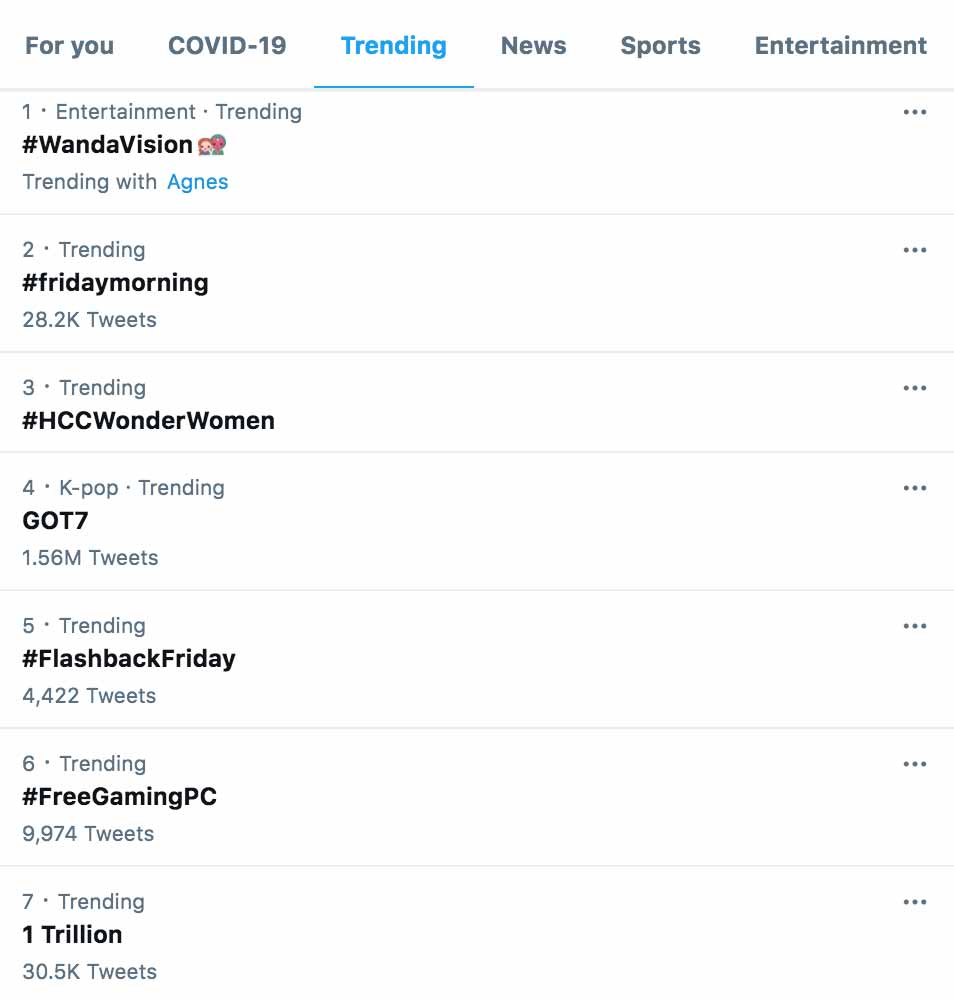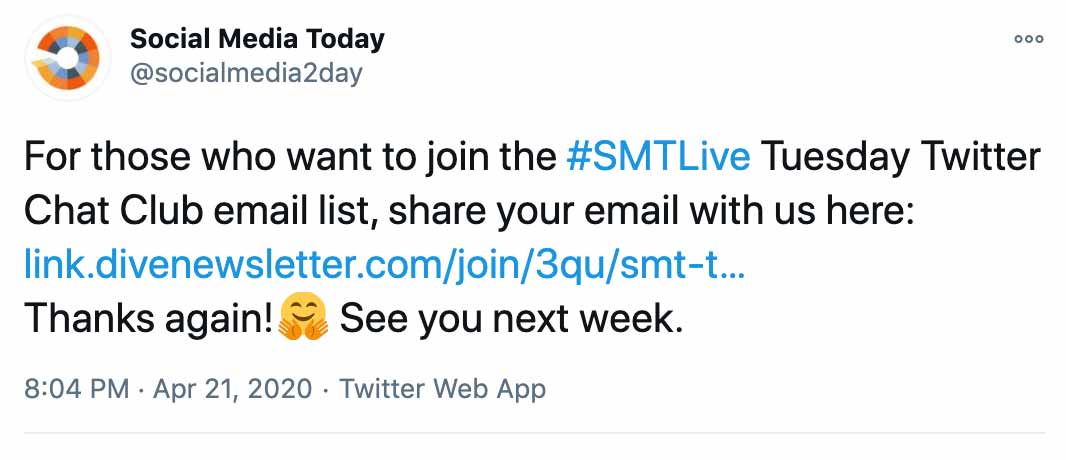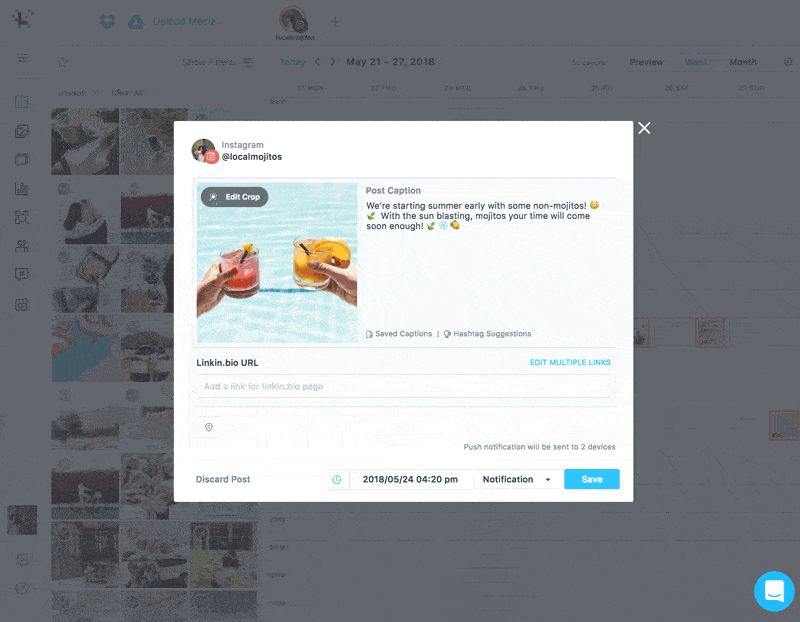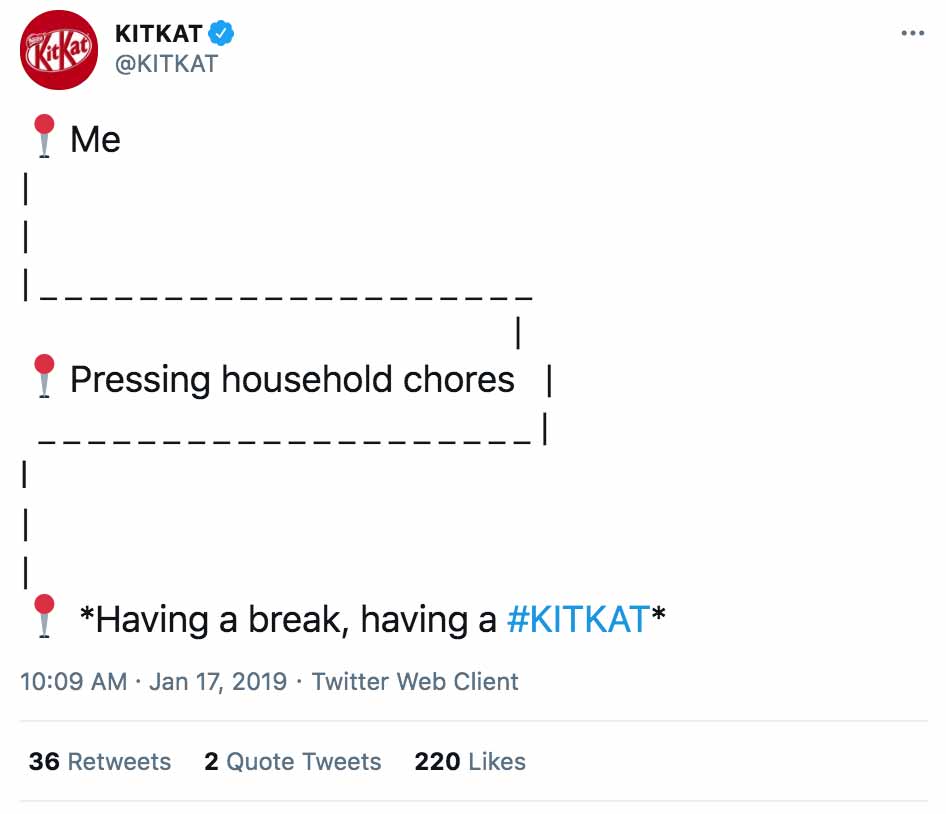February 19, 2021 - Brittany Garlin
Hashtag Analytics 101: Using The Best Hashtags For Your Social Strategy
Businesses, both large and small, have realized the importance of digital and social media marketing. In the earlier days, marketing was done through flyers, word of mouth, signboards, cold calling on the phone, and newspaper and magazine advertisements. With the onset of technology and communication, digitization has taken over the dynamic spread of marketing. Media marketing and content strategizing are the new ways to market all digital content. Discover how to improve your social media strategy through hashtag analytics, and we’ll share some of the key types of hashtags to include.
Businesses can benefit in several ways with excellent social media marketing. Shareable written, visual, and audio content can help access large target audiences. These audiences are critical as a potential customer and client base. When it comes to online marketing, there have been some massive breakthroughs in connectivity. Bridging the communication gap and bringing people closer is the real key strength of marketing. Sharing content in little packets of relevant information that can help end-users and increase your customer base is the way forward.
Small, easily shareable links help group together conversations about a particular topic and make all the content easily accessible worldwide. This easily shareable link is called a hashtag.
What is a Hashtag?
Hashtags or hash marks were introduced in 2007 by a Twitter user – web marketing specialist Chris Messina. He wanted to find a means to group all posts and information about a particular topic in a single place. The ease of collated information using a hashtag before a word became so trendy that Twitter made hashtags official.

Early customers would call messages tweets, republishing was called retweets, and @replies for quick information exchange between countless users on the platform. Twitter recently added the Twitter Story feature known as Twine for rapid story formation and sharing.
With these improvements, hashtags started gaining importance and soon became methods for social activism and prominence gathering. These hashtags, coupled with tweets, retweets, replies, and twines, spread like wildfire across social media platforms with users from all corners of the globe. With the ever-growing popularity of the hashtag, its effectiveness and reach have improved day by day.
Hashtags and their popularity grew so much that other social media giants like Facebook, Instagram, Pinterest, and LinkedIn.
Hashtag Basics:
- Accounts should be public: since most social media platforms work on a social sharing basis, everything shared should be done in shared/ public mode. Hashtagged content will not be visible to people who are non-followers of your account.
- Use specific and relevant hashtags: Trendy, easy to remember, and particular hashtags are always better than vague, hard to remember, and obscure hashtags that may not have anything to do with the subject of discussion.
- Hashtags start with #: words, names, places, things, emotions, and countless other things that begin with a # will be clubbed together. However, adding a space between words will break the link of the hashtag.
- Don’t use too many hashtags: Less is more where hashtags are concerned. Adding too many hashtags to get the points across may come across as unnecessary spam.
- Keep the hashtags short: Wherever possible, it is best to have relevant, specific hashtags without too many words linked together. Small hashtags are easy to remember and recall whenever needed.
Why are Hashtags Important?
While hashtags have become a great craze, there is still the unanswered question – why are they important? The answer is simple – increased engagement. Including relevant hashtags in posts means being a part of the conversation already taking place on that social media platform. You become an active contributor, and your voice is heard along with others. Being an active contributor is the first step to being recognized as a brand and boosting the brand image. You can create better posts, be assured of followers and engagement, and your hashtags can lead to the perfect target audience. Doing this also increases your posts’ relevancy and brings in new followers, customers, and potential clients for the future.
Many businesses create branded hashtags for instant social media following. People like companies that can engage with audiences, create great audio, video, and written content. Promoting the business with branded hashtags and building a loyal customer base is a sure-shot way to increase shareability and credibility in the market. Most companies struggle with finding the correct target audiences and loyal customer bases. With a branded hashtag, you can instantly create shareable content like campaigns, awareness hashtags, new product and service releases, post photos, videos, and infographics that direct traffic to your website or social media accounts.

Clients and customers also like to know the social and ecological work that the brand does. Hashtags help connect people to mobilize and show support towards a serious cause or social drive. Social media platforms use hashtags to spread awareness about medical issues, women’s concerns, gender equality, financial equality, LGBTQ rights, mental health awareness, and a host of other causes.
What are the Different Types of Hashtags?
There are several different types of hashtags, but the three main ones are brand or campaign-specific, content, and trending. There are also event or community hashtags and advertisement hashtags (although these can be clubbed with campaign-specific ones).
Content Hashtags:
These are the keyword hashtags that are easily visible at the beginning, end, or in the body of written content. For this article, relevant hashtags would be #socialmedia or #socialhashtag. Content hashtags can also be about specific products in the company. For instance, if you have a pen brand, a simple hashtag could #xyzblue or #xyzblack, where Xyz is the brand name.
You can also track content hashtags so that you can analyze them and track the metrics and data. Popular content hashtags get shared on social media quickly and tend to bring in followers rapidly.
Trending Hashtags:
Social media applications like Facebook and Twitter allow you to see which hashtags are currently trending. All you have to do is go to the search bar to see which ones are trending. There is usually a magnifying glass on the search bar that indicates open search criteria or field. These powerful platforms have their own tracking devices that instantly help users follow trending hashtags.
These trending hashtags are excellent for incorporating into your company content. However, the only catch here is to ensure that the trending hashtag has relevance to your content. It is of no use if you want to incorporate a tag like #Seattle if your company is based in Europe and has no business dealings with Seattle.
Trending hashtags help control and change the brand’s voice to increase awareness, change the brand position in the market, help gain followers, and increase potential customers and clients. Getting positive viral attention and driving traffic to your products and services is a great way to use trending hashtags for your brand image.
Branded Hashtags:
Branded hashtags are company or business-specific. These hashtags are used for company promotions, branding activities, and to share branding content. These hashtags are also excellent for tagging the company directly on social media posts that are directed only to the brand. Most businesses keep their brand hashtags simple so that they are easily remembered. The name of the brand usually works as a hashtag for brand recall. An example of this type of hashtag would be #pepsi for the carbonated drinks giant. While the company has several other brands, #pepsi will always be their primary one.
Variations of the brand hashtag would be the company name with a variation of the product or service like the pen example stated earlier – #xyzblue or #xyzblack where Xyz is the brand name and blue or black are variations of the pens.
Tracking the brand hashtag is necessary to see how many people are actively following the brand and its content. Monitoring tools help with the active tracking of brand hashtags to get relevant tracking data and analytics.
Community or Event Hashtags:
Events and community hashtags are usually meant for specific times or themes like conferences, industry gatherings, national or international event recognition, and so on. If your business/ company is sponsoring an event or hosting a huge conference, you should ensure social credit on online platforms. This recognition and awareness can be tracked with the help of event or community hashtags.
Community events like internal sports days, human resource week, save the zoo, or any other social and community work should also have their own hashtag to make it easier for users to generate interest and gain followers. Tweeting about the community or social event with a specific, relevant hashtag helps gather sponsorship, funding, awareness and supports the social cause. You can also increase engagement to create a buzz in the community for the event.
Campaigns, launches, digital advertisements, and product-specific hashtags that are used for promotional content can also be clubbed under event hashtags. Businesses wishing to launch new products or services can create a lot of online and social media buzz with the right hashtags. Remember to keep the hashtags interesting, short, and relevant to the advertisement, product, or brand. An example would be #IWalkForChange.
What are Hashtag Best Practices?
Hashtag strategies are plentiful and diverse. Branding, relevance, tracking, and content discovery are some of the benefits of using hashtags. However, some of the best practices for using them are as below:
- Use Capitals Sparingly: You should capitalize hashtags when needed, for example, #BurgerKing, but using it unnecessarily can be off-putting to large audiences. Highlighting proper nouns in hashtags is also a great way to create brand name awareness subconsciously.
- Use Short Hashtags: As we’ve mentioned earlier, it is best to keep the hashtags short and sweet to be memorable. A mixed length is an excellent way to go forward since some text fields may have space constraints.
- Use Relevant Hashtag Trends: Instead of capitalizing on each hashtag trend, it is best practice to only use those relevant to your business brand and image.
- Use Unique Hashtags: Creating original hashtags are better than using previously owned ones. Search for unique hashtags or come up with one that resonates with your brand image.
Best Practice: How Many Hashtags To Use Per Platform
- Twitter: With Twitter, using up to 2 hashtags per tweet can double up the engagement with followers. Using more than two hashtags in a single tweet can actually decrease engagement as it can be considered spam.
- Facebook: As with Twitter, Facebook post hashtags should be kept to 2 per post. You should make a wise selection about the hashtags based on relevancy and uniqueness when posting on Facebook. Facebook users tend to engage more in information sharing and discovering new hacks and trends when they click on a hashtag.
- Instagram: Instagram allows 30 hashtags per post. Using 30 hashtags ensures that your public post is visible to countless people currently viewing image and video content. Extra hashtags on Instagram result in more extensive outreach and followers.
- Pinterest: Pinterest has not shown viable results with hashtags, but for posting and pinning content, 1 – 2 hashtags can be used.
- LinkedIn: LinkedIn recommends using 2 – 3 relevant hashtags per post. LinkedIn also uses a search based on hashtags for quick engagement. Including relevant hashtags will actually drive up the activity level on the post.
What is Hashtag Research?
Finding the best hashtags for your brand and making them work are usually the largest concerns for businesses. Hashtag research should start with scouring popular social media providers’ search bars like Facebook, Twitter, and Instagram. Using applications (that can be purchased) to check the online inventory for hashtags, popularity, and uniqueness is also an excellent way to start the research. You may want to check out Later’sHashtag Suggestions feature.

With hashtags, popularity is critical. Less used hashtags that gain popularity quickly are the ones that should be used. Professional SEO experts can help with hashtag research and source the best hashtags for your brand and image. These hashtags can be tracked across various social media like Instagram, Facebook, Twitter, etc.
Recurring hashtags like those used for each day of the week are trendy, useful, and easily shared to create awareness.
Some examples could be:
- Monday: #MentalMonday
- Tuesday: #TransformationTuesday
- Wednesday: #WakeUpWednesday
- Thursday: #ThrowbackThursday
- Friday: #ForeverFriday
- Saturday: #Caturday
- Sunday: #SundayFamilyDay
Creating brand awareness with a daily hashtag can also keep the brand image and name constant in people’s minds. The brevity of the hashtag and brand name will lead to greater brand recognition in the long term.
How to Track Hashtags?
Social media is useful only if it can be tracked and analyzed to add value to the brand and business. Since hashtags are used to increase engagement and brand awareness amongst users and followers, it is essential to track all the metrics for quantifiable data. Using the hashtag as a powerful online tool can help optimize your social media content, formulate media strategies, and even increase revenue each year. Using an SEO specialist to help track the hashtags will decrease costs and increase revenues each year while creating brand awareness and increasing potential client and customer bases.
Important Hashtag Metrics to Track:
- Reach: Knowing how many people are viewing the content is crucial to the success of your hashtag. The hashtag and media strategy only successful when it reaches the maximum number of people. It would be best if you tried different tricks and tactics to increase outreach for your target groups.
- Popularity: Popularity in hashtags is key to ensuring it turns up in automatic searches. Popularity helps determine the relevancy of the data for users. Shareable content should be made using popular hashtags, so it becomes easy to recall the brand and message of the content begin shared.
- Users: Users are ideally your target audience. However, if the hashtag gains unprecedented popularity and success, it may get viral, and the user metrics will get skewed. To attain this, most businesses create social awareness or viral content that helps get instant publicity for the company.
- Interactions: Retweeted or reposted content with the same hashtag is a sure-shot way of understanding audience interaction. Interacting with the brand hashtags ensures that the business is expanding with the help of these hashtags.
Hashtag analytics is the key to online social media success. It would help if you approached professional digital marketing firms to streamline the entire process and strategize unique, trending, and viral hashtags. Allowing them to run analytics, collect relevant data, and conduct research on your target audience is a fantastic way to ensure that your brand is positioned correctly in the market. Businesses that concentrate on improving their online and social media presence usually see a high positivity rate associated with their brand.
Grow with the #1 marketing agency network and top destination for businesses to hire
Sign up for Agency Vista, and see why over 50,957 marketing agencies trust us to grow their online presence and foster credible relationships with businesses. We’re free forever, and you can upgrade, downgrade, or cancel any time.
Get Started
Get started free
Setup in minutes
No credit card required

Agency Vista is the new way for brands to find and easily connect with marketing agencies. Explore 50,957 verified profiles and reviews to find the right agency for your business.
Copyright © 2026 Agency Vista LLC. All rights reserved. Lovingly made in NYC.
